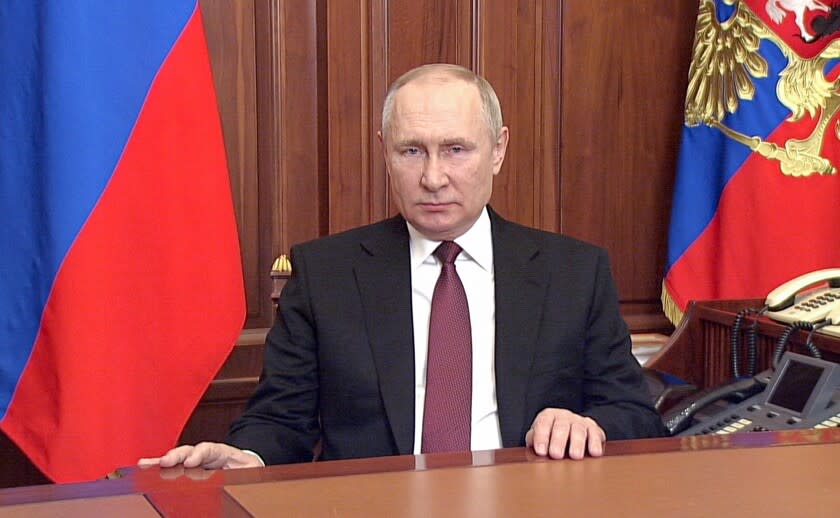Biden imposes sanctions on Putin as Russian president continues attack on Ukraine

- Oops!Something went wrong.Please try again later.
- Oops!Something went wrong.Please try again later.
- Oops!Something went wrong.Please try again later.
- Oops!Something went wrong.Please try again later.
President Biden imposed economic sanctions Friday on Russian leader Vladimir Putin and a $10-billion Kremlin-run investment fund as the U.S. sought to bolster an economic pressure campaign aimed at punishing Moscow for launching its unprovoked war with Ukraine, the White House announced.
Biden's move to sanction the Russian president directly came after a call with Ukrainian President Volodymyr Zelensky, who has expressed frustration that the U.S. and other democratic nations were leaving his country's military "all alone" to fight the Russian onslaught.
White House Press Secretary Jen Psaki confirmed on Friday that the administration was imposing individual sanctions on Putin, one of his country's richest men.
Biden, she said, decided to join the European Union in sanctioning the Russian president and his foreign minister, Sergei Lavrov, after speaking with European Commission President Ursula von der Leyen. The EU had taken the action earlier in the day.
Hours later, Psaki announced via tweet the move to impose sanctions on the Russia Direct Investment Fund. She described the fund as "a state-owned financial entity that functions as a sovereign wealth fund, which is supposed to attract capital into the Russian economy in high-growth sectors."
The moves continue a gradual ratcheting up of economic sanctions and export controls this week as Putin authorized the invasion of Ukraine, which has been an independent country since the dissolution of the Soviet Union.
The White House has so far targeted Russia's largest banks and several oligarchs who are close to Putin. It has avoided hitting the country's energy sector out of concern about the impact on energy markets and stopped short of barring Russia from the SWIFT banking system, a secure communications network vital to international transactions that connects more than 11,000 banks.
The U.S., with Germany leading the way, also moved to halt the Nord Stream 2 gas pipeline project that Putin has long sought to deepen Europe's dependence on Russia's energy resources.
Biden and NATO allies have moved mostly in lockstep in responding to Putin's aggression. But with Russian bombs exploding in Kyiv, Ukraine's capital, a clearly exhausted Zelensky pleaded on Friday for the U.S. and Europe to do more to back Ukraine's military and the civilians who are taking up arms and massing in the streets.
Following his first call with Biden since the invasion began in earnest on Tuesday, Zelensky tweeted his gratitude for additional U.S. assistance, suggesting that more sanctions and defense aid from Washington were in the offing.
This story originally appeared in Los Angeles Times.

